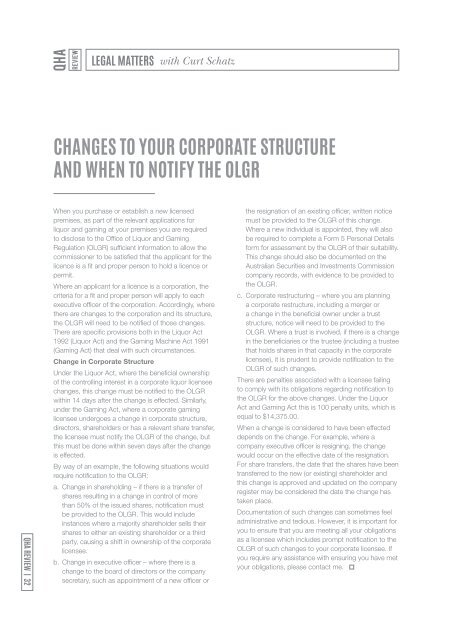QHA-Review_August_Digital
Create successful ePaper yourself
Turn your PDF publications into a flip-book with our unique Google optimized e-Paper software.
LEGAL MATTERS with Curt Schatz<br />
CHANGES TO YOUR CORPORATE STRUCTURE<br />
AND WHEN TO NOTIFY THE OLGR<br />
<strong>QHA</strong> REVIEW | 32<br />
When you purchase or establish a new licensed<br />
premises, as part of the relevant applications for<br />
liquor and gaming at your premises you are required<br />
to disclose to the Office of Liquor and Gaming<br />
Regulation (OLGR) sufficient information to allow the<br />
commissioner to be satisfied that the applicant for the<br />
licence is a fit and proper person to hold a licence or<br />
permit.<br />
Where an applicant for a licence is a corporation, the<br />
criteria for a fit and proper person will apply to each<br />
executive officer of the corporation. Accordingly, where<br />
there are changes to the corporation and its structure,<br />
the OLGR will need to be notified of those changes.<br />
There are specific provisions both in the Liquor Act<br />
1992 (Liquor Act) and the Gaming Machine Act 1991<br />
(Gaming Act) that deal with such circumstances.<br />
Change in Corporate Structure<br />
Under the Liquor Act, where the beneficial ownership<br />
of the controlling interest in a corporate liquor licensee<br />
changes, this change must be notified to the OLGR<br />
within 14 days after the change is effected. Similarly,<br />
under the Gaming Act, where a corporate gaming<br />
licensee undergoes a change in corporate structure,<br />
directors, shareholders or has a relevant share transfer,<br />
the licensee must notify the OLGR of the change, but<br />
this must be done within seven days after the change<br />
is effected.<br />
By way of an example, the following situations would<br />
require notification to the OLGR:<br />
a. Change in shareholding – if there is a transfer of<br />
shares resulting in a change in control of more<br />
than 50% of the issued shares, notification must<br />
be provided to the OLGR. This would include<br />
instances where a majority shareholder sells their<br />
shares to either an existing shareholder or a third<br />
party, causing a shift in ownership of the corporate<br />
licensee.<br />
b. Change in executive officer – where there is a<br />
change to the board of directors or the company<br />
secretary, such as appointment of a new officer or<br />
the resignation of an existing officer, written notice<br />
must be provided to the OLGR of this change.<br />
Where a new individual is appointed, they will also<br />
be required to complete a Form 5 Personal Details<br />
form for assessment by the OLGR of their suitability.<br />
This change should also be documented on the<br />
Australian Securities and Investments Commission<br />
company records, with evidence to be provided to<br />
the OLGR.<br />
c. Corporate restructuring – where you are planning<br />
a corporate restructure, including a merger or<br />
a change in the beneficial owner under a trust<br />
structure, notice will need to be provided to the<br />
OLGR. Where a trust is involved, if there is a change<br />
in the beneficiaries or the trustee (including a trustee<br />
that holds shares in that capacity in the corporate<br />
licensee), it is prudent to provide notification to the<br />
OLGR of such changes.<br />
There are penalties associated with a licensee failing<br />
to comply with its obligations regarding notification to<br />
the OLGR for the above changes. Under the Liquor<br />
Act and Gaming Act this is 100 penalty units, which is<br />
equal to $14,375.00.<br />
When a change is considered to have been effected<br />
depends on the change. For example, where a<br />
company executive officer is resigning, the change<br />
would occur on the effective date of the resignation.<br />
For share transfers, the date that the shares have been<br />
transferred to the new (or existing) shareholder and<br />
this change is approved and updated on the company<br />
register may be considered the date the change has<br />
taken place.<br />
Documentation of such changes can sometimes feel<br />
administrative and tedious. However, it is important for<br />
you to ensure that you are meeting all your obligations<br />
as a licensee which includes prompt notification to the<br />
OLGR of such changes to your corporate licensee. If<br />
you require any assistance with ensuring you have met<br />
your obligations, please contact me.
















